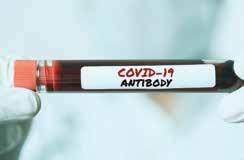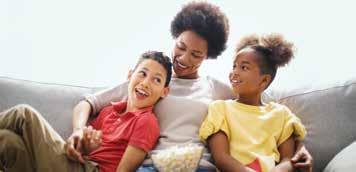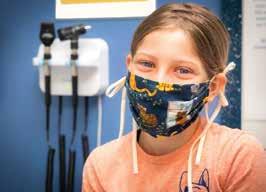
14 minute read
SEATTLE CHILDREN’S
by ParentMap
A Seattle Children’s Publication | Winter 2021
Grieving Life Before COVID-19
Life during the coronavirus pandemic is often described as ‘the new normal.’ But it’s not! There’s nothing normal about constant uncertainty, fear, disruption and disappointment. As the pandemic wears on, people of all ages are experiencing grief. We’re grieving the loss of everyday life before COVID-19.
Our kids are missing important activities like seeing their classmates at school, having a group of friends over, playing on a sports team, going to sleepovers, and enjoying the latest superhero movie in a big theater. They’re mourning the loss of special plans and family traditions that were stolen by the pandemic: their own birthday party, a graduation ceremony, a trip to Disneyland, visiting grandparents, big holiday gatherings… It’s a very long list! And of course, many kids have lost a stable and familiar way of life due to their parents’ lost wages and job uncertainty.
In addition to grieving the loss of normal life, many children have also lost a loved one during the pandemic — someone they likely couldn’t visit before death. On top of that, these children haven’t had the benefit of rituals like

Washington’s Mental Health Referral Service for Children and Teens
You can get help connecting with mental health providers who have openings in their schedule and can meet your child’s needs. This service links you to providers in your local area who fit your child’s specialty needs and insurance coverage.
Any Washington family can use this free service, which makes referrals for children and teens 17 and younger from across Washington. Get connected with effective outpatient mental health services in your community.
to learn more: Visit seattlechildrens.org/clinics/ washington-mental-health-referralservice/family. funerals and memorial services that offer comfort and closure.
Grief can come and go, and we all experience it in a variety of ways. Some amount of anxiety, sadness, denial and anger is normal — and so are minor changes in sleep and appetite. It’s important that we talk with our kids about their feelings and help them express all their emotions. And of course, it’s crucial that we model healthy coping behaviors. The link below has more on grief and loss, and how families can work through it all in a positive way.
Speaking of positive, many families are finding creative new ways to do things in the midst of a pandemic, like virtual gatherings and drive-by celebrations. Families are also forming ‘make-good’ plans for the postpandemic future. It’s fun to dream up these plans, such as having two Thanksgiving dinners in a single year, taking a family vacation at a favorite destination, tightly embracing everyone on your missed-hugs list, hosting a mask-burning party, or gathering with family and friends to re-celebrate all the missed birthdays — complete with a dozen different cakes and a dozen flavors of ice cream.
Here’s to the end of the pandemic, and to a new appreciation of how amazing ‘normal’ can be!
We’re hearing a lot about antibody testing for COVID-19. But what are antibodies? Simply put, whenever our immune system meets a new germ, it makes new antibodies that ‘remember’ it so that the next time that germ shows up, those antibodies alert our body and help it fi ght off the threat before it can make us sick. One way to gain these essential antibodies is getting sick with a disease. But the best and safest way is through a vaccine — which allows you to skip the sickness and go straight to being protected. Today, through the rigorous trial process, U.S. scientists are developing a vaccine (and likely more than one) that will safely give us eff ective antibodies to coronavirus.

Cold-Weather Car Seat Safety
Bundling up your child in cold weather can create an extra challenge when it comes to ensuring they are safely buckled into their car seat. When kids are wearing bulky clothes or are wrapped in a blanket, it causes the car seat harness to fi t improperly. In a crash, the fl uff y padding or fi ll material immediately fl attens from the force, creating extra space under the harness. A child can then slip through the straps and be thrown from the seat. Bulky or puff y clothing, including winter coats and snowsuits, should not be worn underneath the harness. Instead, dress your child in thin layers (like cozy fl eece and leggings), then add a hat, gloves, socks and footwear for warmth. Aft er ensuring the harness fi ts snugly, place a coat or blanket over the straps. One easy trick — aft er buckling up — is to have your child extend their arms straight forward, then slide the coat sleeves up their arms, so they’re wearing it backwards. Also, remember to keep an emergency bag in the car with extra blankets, water, snacks and a fi rst-aid kit.
to learn more: Visit https://rb.gy/qljebf.
Reducing Sugar in Your Child’s Diet
Most kids consume too much sugar, and it’s putting their health at risk. A diet that’s too high in sugar can lead to serious problems including obesity, heart disease and diabetes.
Th e American Heart Association says children should have no more than 3 to 4 teaspoons (12 to 16 grams) of sugar per day. But limiting sugar can be tricky. Many foods and drinks contain extra sugar that goes in during processing, known as ‘added sugar.’ While most food labels now list added sugar separately, it’s still important to check labels for the many diff erent names used for sugar, including corn sweetener, high-fructose corn syrup, dextrose, fructose and glucose. And keep in mind that ‘healthy’ foods like yogurt, bread, cereal, tomato sauce and soup can contain a surprising amount of added sugar.
It’s best to eat mostly whole, unprocessed food — including lots of fresh or frozen fruits and vegetables. When it comes to beverages, make water your go-to drink. Milk is also a good option; while it does contain natural sugar (lactose) it provides calcium, protein, vitamin D and other nutrients. Fresh fruit is a better option than fruit juice. Th e American Academy of Pediatrics recommends no more than 4 ounces of 100% fruit juice per day for children ages 1 to 3. For kids ages 4 to 6, no more than 4 to 6 ounces, and for ages 7 to 14 no more than 8 ounces. Infants under 1 year old should never have fruit juice. And say no to soda: a 12-ounce can has a whopping 10 teaspoons (40 grams) of added sugar — that’s roughly triple the daily maximum recommended amount!

Triple-Safe Storage for Firearms
When it comes to storing fi rearms safely, it’s important to keep in mind that ‘hidden’ is not the same as safe. Kids are naturally curious explorers, and are very likely to fi nd any hidden fi rearm. And when they do — even when they’ve been warned to never touch a gun — the temptation to play with it can be too much to resist. If there is a fi rearm in your home, locking it up is the only sure way to prevent a tragedy. Always practice triplesafe storage: store guns unloaded and locked up, then lock away ammunition separately, in a diff erent location. Ask family and friends to use these safe-storage steps. When fi rearms and ammunition are securely stored, suicide by fi rearm is reduced by 78% and accidental shootings are reduced by 85%.

Quick Tip
Have you heard the saying, “There’s no bad weather, only bad clothing?” Bundle up and get your child or teen moving their body outside every day.
facebook.com/seattlechildrens
instagram.com/seattlechildrens
twitter.com/seattlechildren
youtube.com/seattlechildrens
Healthy Sleep Habits
Do you count down the minutes to your child’s bedtime so you can get some chores done, or have some quiet time for yourself? You’re not alone! Ensuring your child gets a restful sleep requires good ‘sleep hygiene’ — which refers to helpful routines and habits. Consistency is key: stick to regular bedtimes and wake times. Create calming before-bed rituals like bathing, brushing teeth and story time. In the hour or so before bedtime, avoid high-stimulation activities, including exercise and screen time. Make sure their bedroom is cool and quiet, and that their bed and PJs are clean and comfortable. Ideally, their bed should be a place just for sleeping — not for remote learning and other daytime activities.

Catch Up on Checkups
Th e year 2020 was full of special challenges, many of which we’ll continue to face in 2021. As complicated and hectic as family life has been since the pandemic began, if you’ve put wellchild visits and dental cleanings on the back burner, it’s important to get them scheduled now. Regular medical checkups are a chance to track growth and development, catch up on missed vaccines and screen for mental wellness. Th ese visits are also a time to touch base on whatever you have questions about, including your child’s sleep, safety, nutrition and exercise. And remember that dental health is a key part of your child’s overall health; being faithful with regular checkups helps prevent future problems.

Regional Clinic Locations
• Bellevue • Olympia • Everett • Tri-Cities • Federal Way • Wenatchee
Primary Care Clinic
• Odessa Brown Children’s Clinic
Main Hospital Numbers
206-987-2000 866-987-2000 (Toll-free)
Online Resources
Visit seattlechildrens.org for the following: • Child Health Advice • my Good Growing email newsletter • Doctor Finder • On The Pulse and Autism blogs • Medical condition information • Health & safety information • Ways to help Seattle Children’s • Research Institute information
Heather Cooper is the Editor of Good Growing, which is produced four times a year by the Marketing Communications Department of Seattle Children’s. You can fi nd Good Growing in the January, April, July and October issues of ParentMap and on our website seattlechildrens.org. For permission to reprint articles for noncommercial purposes or to receive Good Growing in an alternate format, call 206-987-5323. The inclusion of any resource or website does not imply endorsement. Your child’s needs are unique. Before you act or rely upon information, please talk with your child’s healthcare provider. © 2021 Seattle Children’s, Seattle, Washington.
As the COVID-19 situation changes, we continue to adjust or postpone our classes and events to follow public health recommendations. We now offer some classes online while some are on pause. Please check our website for the latest information. Scholarships are available. If you would like to ask about a scholarship, use the contact information for the class you’re interested in to connect with the registrar.
PARENTING CLASSES
Autism 101
This free 90-minute lecture is designed to provide information and support to parents and families of children recently diagnosed with an autism spectrum disorder. A portion of each session is dedicated to answering questions from the attendees.
View dates and locations, sign up for live streaming or view a past lecture at seattlechildrens.org/ autism101. Email Autism101@seattlechildrens.org if you have questions.
Autism 200 Series
Autism 200 is a series of free 90-minute classes for parents and caregivers of children with autism who wish to better understand autism spectrum disorder. Each class features a different topic.
Classes are usually offered on the third Thursday of the month, 7 to 8:30 p.m., via live streaming. View dates and topics, sign up for live streaming or view past Autism 200 lectures at seattle childrens.org/autism200. Email Autism200@ seattlechildrens.org if you have questions.
Babysafe
Babysafe is a 4-hour class for new and expectant parents and others who care for babies. Topics include infant development, baby safety, injury prevention and care of common injuries for infants from birth through 12 months of age. Infant CPR is demonstrated and practiced, but this is not a certification class.
This class is currently available virtually via Zoom. The fee is $85 and each registration is good for 2 people from the same family. View dates at seattlechildrens.org/classes or call 206-789-2306 if you have questions.
What Our Boys Need: A Parent Talk
This talk gives parents and grownups who love, support, coach, teach and care about boys a unique opportunity to explore your relationship with boys while answering some of the questions around boys’ physical, emotional and social development.
This class will be offered online via Zoom on Thursday, January 14 at 7 p.m. Register at seattlechildrens.org/classes or call 206-789-2306 if you have questions.
Heartsaver First Aid, CPR and AED
This video-based class for parents and caregivers covers how to treat bleeding, sprains, broken bones, shock and other first-aid emergencies. Also includes infant, child and adult CPR and AED use. Students receive an American Heart Association Heartsaver First Aid, CPR, AED course completion card that is valid for 2 years. This class is being offered as a two-part series. The series includes a virtual session as well as a short in-person skills check. Please check the website for the most current information at seattlechildrens.org/classes or call 206-987-9878 if you have questions.
What Our Girls Need: A Parent Talk
This talk gives parents and grownups who love, support, teach, coach and care about girls a unique opportunity to explore your relationship with girls while answering some of the questions around girls’ physical, emotional and social development.
This class will be offered online via Zoom on Tuesday, February 9 at 7 p.m. Register at seattlechildrens.org/classes or call 206-789-2306 if you have questions.
Staying Close While Standing Back: The Art and Science of Parenting Adolescents
For parents of preteens and teens looking for new ideas on everyday conversations. Expert Julie Metzger will give parents an opportunity to consider strategies to strengthen family communication.
This class will be offered online via Zoom on Tuesday, March 2 at 7 p.m. Register at seattle childrens.org/classes or call 206-789-2306 if you have questions.
Youth Mental Health First Aid
This 8-hour class is for adults who regularly interact with adolescents ages 12 to 18. Youth Mental Health First Aid will improve your knowledge of mental health and substance use problems and will teach you how to connect youth with care when needed.
A virtual version of Youth Mental Health First Aid is now available for free. The date you register for is the date of the live instructor-led course. View dates at seattlechildrens.org/classes or call 206-987-9878 if you have questions.
CHILD, PRETEEN AND TEEN CLASSES
Better Babysitters
For youth, ages 11 to 14. Students learn about responsible babysitting, basic child development, infant and child care, safety, handling emergencies, age-appropriate toys, business tips and parent expectations.
This class is offered in Seattle, Bellevue, Everett, and Federal Way. In-person classes are on pause at this time. Please check the website for the most current information at seattlechildrens. org/classes or call 206-987-9878 if you have questions.
CPR and First Aid for Babysitters
For youth, ages 11 to 15. Topics include pediatric CPR, treatment for choking, and first-aid skills. Students receive an American Heart Association Heartsaver Pediatric First Aid, CPR, AED completion card, which is valid for 2 years.
This class is being offered as a two-part series. The series includes a virtual session as well as a short in-person skills check. Please check the website for the most current information at seattlechildrens.org/classes or call 206-987-9878 if you have questions.
The Chat
The Chat is a new online workshop series on puberty and sex that reflects the content from the in-person classes, For Boys and For Girls. Offered via Zoom, each 45-minute workshop is for preteens 10 to 12 years old, plus a parent or trusted adult.
You may take any individual workshop or all 5. If you register for all 5 events, we recommend starting with BO, Pimples and Hair — Oh My! and ending with Being Connected: Sex, Love and Everything In Between. While families can choose to attend any combination of workshops, the information in earlier sessions provides a foundation for understanding later sessions. The cost is $25 per workshop or the series of 5 for $100. View dates at seattlechildrens.org/ classes or call 206-789-2306 if you have questions. See a trailer for The Chat at greatconversations.com.
EVENTS
Free Virtual Car Seat Checks
King County Certified Child Passenger Safety Technicians are offering free virtual car seat check appointments via video chat platforms. For more information, email Laura Miccile at laura.miccile@ kingcounty.gov or call 206-477-8664.
South County Fire and Safe Kids Snohomish County are offering free virtual car seat classes. Registration is required. Visit southsnofire.org/ education/child-passenger-safety.
Ready for a REAL Summer in 2021? CHECK OUT JEWISH OVERNIGHT CAMP!

Say Hello to:
Live, in-person adventures like ziplining, canoeing, and campfires
Authentic connections with new and lifelong Jewish friends
Small groups, masks, and pristine hygiene Silly fun with water balloons, color war, arts, music, and capture the flag
Singing in Hebrew, connecting to Israel, and bonding over a rich heritage
Heart thumping challenge courses and days filled with screen-free activities Generous scholarships*
* Generous scholarships supported by the Samis Foundation, and first-time camper incentive grants are available through the Jewish Federation of Greater Seattle Needs-Based Camp Scholarship and One Happy Camper programs



